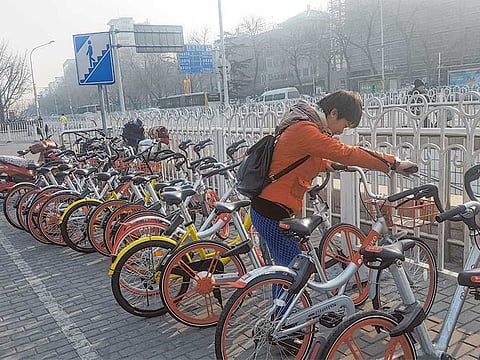Smartphones make bike-sharing convenient in Beijing
Two new start-ups have made biking popular again in the one-time Bicycle Kingdom

Beijing: The capital of China was once known as Bicycle Kingdom, and two new start-ups are trying to make the two-wheeled mode of transport popular again among road users.
Backed by venture funds and other technology giants, both Ofo and Beijing Mobike Technologies are making bike-sharing a common practice in the city.
What makes their services different from other similar services in places like London and Paris is that riders in Beijing can pick any bike they find and literally leave it anywhere in the city once they are done.
This is made possible by GPS tracking and smartphone connectivity, and residents told Gulf News they have quickly bought into the new bike-sharing idea for the convenience and cost savings it offers them.
“Many Beijing workers live about 50 to 60 kilometres away from their workplaces. It is simply too costly to drive all the way to work. So you ride a bike to the subway station, take the subway, and take another bike to work after you disembark,” Xu Fenglian, 43, a travel agent, told Gulf News.
Bike-sharing itself is not a novel concept, and the Chinese Government has long provided thousands of public bicycles. These are free for the first hour and charged at 1 yuan for every subsequent hour of use. But they have to be dropped off at designated locations, and simply do not offer the same level of flexibility that today’s tech-savvy population is used to.
Both Ofo and Mobike bicycles are distinctively coloured, making them easy to spot. Mobike’s bicycles are usually orange-red, and Ofo’s are yellow in colour. Once a potential customer spots a bike, they simply have to scan the QR code. This unlocks the bicycle for use, and the hourly charge ranges from half a yuan to 1 yuan. Mobike also allows users to use the app to locate available bikes in the vicinity.
As reported by newswire Bloomberg, Mobike had said it would have about 100,000 bikes available in Beijing by the end of 2016. It also operates in other major Chinese cities, including Shanghai, Guangzhou and Shenzen. Ofo, on the other hand, connects about 217,000 bicycles across China already, including private bikes that are willingly shared by their owners.
In a city that is known for its traffic gridlocks and air pollution, this new method of bike-sharing is also a welcome solution, Beijing locals say. It allows them to make use of a well-connected 700-kilometre subway network, and saves them the trouble of wasting time on the road, Fenglian explained. It also helps that there are enough bicycles to go around, especially near popular locations.
Ma Rongsheng, a 43-year-old university teacher, said he and his wife, as well as his elderly father, use the bikes at least once a week for various errands.
“They are just cheap and convenient,” he said simply.
Bill, a 46-year-old quality manager, said he shares a bike to and from work every day, and that his wife shares one at least three times a week.
In fact, the new bike-sharing platforms have been so well-received that it is hard to believe that they have only been around since September 2016. Most residents simply take it as a given that they will be able to find a smartphone-activated two-wheeler whenever they need it.
“They’re everywhere, so you never really have to worry about walking if you don’t feel like,” Fenglian said.
Sign up for the Daily Briefing
Get the latest news and updates straight to your inbox



